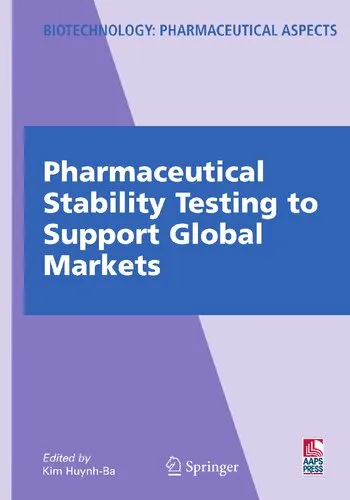Pharmaceutical Stability Testing to Support Global Markets (Biotechnology: Pharmaceutical Aspects, XII)
4.5
Reviews from our users

You Can Ask your questions from this book's AI after Login
Each download or ask from book AI costs 2 points. To earn more free points, please visit the Points Guide Page and complete some valuable actions.Introduction to "Pharmaceutical Stability Testing to Support Global Markets"
The pharmaceutical industry plays a pivotal role in advancing healthcare by developing safe and effective medicines. However, developing a pharmaceutical product is far more complex than it may appear, involving not just innovation but also compliance with rigorous regulatory standards to meet the needs of diverse global markets. "Pharmaceutical Stability Testing to Support Global Markets (Biotechnology: Pharmaceutical Aspects, XII)" serves as an authoritative guide to understanding pharmaceutical stability testing—a cornerstone of drug development and manufacturing. Authored and edited by leading experts in the pharmaceutical and biotechnology fields, this book provides an in-depth exploration of stability testing practices, regulatory expectations, global harmonization, and scientific principles.
This comprehensive volume is designed to meet the needs of a wide audience, including regulatory professionals, pharmaceutical scientists, quality control teams, regulatory agencies, and even seasoned academics. By delivering cutting-edge insights into stability testing, the book provides readers with invaluable tools to successfully navigate the regulatory landscape and maintain compliance in the international marketplace. Its focus on global markets makes it particularly relevant in today’s interconnected world, where pharmaceutical companies must address the nuanced requirements of multiple regulatory authorities across countries.
Detailed Summary of the Book
The book is meticulously structured to offer both a foundational understanding of pharmaceutical stability testing and an exploration of advanced topics. It begins with an overview of the principles of stability testing, covering the intrinsic and extrinsic factors that might impact the shelf-life and efficacy of pharmaceutical products. The content dives into essential topics, such as chemical, physical, and microbiological stability considerations, and includes practical discussions about conducting stability studies during development, both for small-molecule drugs and biologics.
From there, the book delves into region-specific regulatory requirements, contrasting the expectations of regulatory bodies like the FDA, EMA, and ICH with those of emerging markets. It helps readers understand the nuances of stability protocols in jurisdictions such as Latin America, Asia-Pacific, and Africa, offering a roadmap for multinational compliance. Discussions on climatic zones and how they affect stability testing highlight the importance of tailoring stability protocols for diverse market conditions.
A significant portion of the book is dedicated to real-world applications, including case studies on handling stability-related challenges during the drug approval process. It emphasizes the rising role of digitalization and predictive tools, such as Artificial Intelligence (AI), in streamlining stability testing. Finally, the book offers strategies for addressing out-of-specification results, risk management, and lifecycle management of stability data.
Key Takeaways
- Comprehensive understanding of stability testing methodologies and their role throughout a drug’s lifecycle.
- Insight into global regulatory requirements, including ICH guidelines and regional expectations.
- Strategies for designing robust stability studies to align with international pharmaceutical markets.
- Focus on both traditional pharmaceuticals and biologics to ensure relevance across therapeutic modalities.
- Practical advice for implementing stability programs in emerging markets and navigating logistical challenges.
- The role of modern predictive tools and data systems in optimizing stability-related decision-making processes.
Famous Quotes from the Book
"Stability testing is not just a regulatory requirement; it is an uncompromising commitment to ensuring the safety and effectiveness of medicines across their entire lifecycle."
"In the era of globalization, the stability of a pharmaceutical product transcends the boundaries of science—it becomes a testament to adaptability across diverse climates, regulatory systems, and cultures."
Why This Book Matters
"Pharmaceutical Stability Testing to Support Global Markets" is an essential resource for professionals striving to excel in the pharmaceutical industry’s increasingly complex and global environment. Stability testing is a critical aspect of drug development, ensuring that medications remain safe, effective, and of high quality until they reach the patient. This book provides a robust foundation for designing, executing, and interpreting stability studies, all while considering the challenges posed by diverse regulatory standards and climatic conditions.
What makes this book particularly impactful is its focus on global markets. Unlike many resources that center solely on U.S. or European regulations, this volume takes a truly international approach, enabling readers to understand and comply with regulatory frameworks worldwide. It highlights practical solutions to real-world problems and integrates traditional methodologies with modern advancements to drive innovation and efficiency.
Ultimately, this book matters because the stakes in pharmaceutical stability testing are high—it’s about protecting the lives and well-being of patients around the globe. By shedding light on the intricacies of stability testing and regulatory compliance, the book empowers pharmaceutical professionals to uphold these ideals while supporting their organizations’ global aspirations.
Free Direct Download
You Can Download this book after Login
Accessing books through legal platforms and public libraries not only supports the rights of authors and publishers but also contributes to the sustainability of reading culture. Before downloading, please take a moment to consider these options.
Find this book on other platforms:
WorldCat helps you find books in libraries worldwide.
See ratings, reviews, and discussions on Goodreads.
Find and buy rare or used books on AbeBooks.
1172
بازدید4.5
امتیاز50
نظر98%
رضایتReviews:
4.5
Based on 0 users review
"کیفیت چاپ عالی بود، خیلی راضیام"


